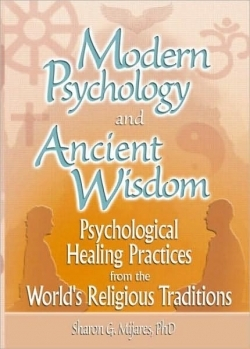Modern Psychology and Ancient Wisdom
Psychological Healing Practices from the World's Religious Traditions
Ten writers, including the editor, present eight chapters on the meeting of modern psychotherapy and spiritual healing traditions. More like meditations than treatment manuals, the essays open windows of enlightenment not just to therapists, but to any reader seeking ideas and understanding from diverse traditions. The chapters touch on Buddhism, Christianity, Goddess Spirituality, Judaism, Native American Psychospirituality, Sufism, Taoism, and Yoga / Hinduism. Among these ancient pathways, commonalities exist alongside striking differences.
The author, a clinical psychologist, and her mentor, Stephen Gilligan, who contributes a preface, invite readers to embrace these differences, which “create a textured symphony of enlightened consciousness.” To enjoy and profit from this effort, one need not embrace a particular belief, but one must be tolerant, curious, and hopeful-not caught up in protest against a particular tradition or against religion in general.
One theme running through the book could be called the wedding of certainty and humility. Religious teachers are usually committed to precepts, to unshakable beliefs, even while seeking renewed insight with openness and wonder. Psychotherapists share this outlook to some degree, but they may hedge about the theories in which they have the most faith because they need to be “objective” and push their own dogmas out of awareness.
Another common factor in these chapters is the use of narrative, with rich metaphor and striking symbolism. Stories that entertain, instruct, and last for centuries, and that have cognates in far-away places and times, speak important truths. Psychotherapy clients are not just battling symptoms from a diagnostic catalog; they seek meaning, identity, and purpose in a puzzling universe, sharing (and rewriting) their own stories with the help of expert listeners. Whole human stories are to scientific theories as wholesome foods are to vitamins: the latter are essential elements, but the former have nutrients that still defy analysis.
Although there is no chapter on Islam, the Qu’ran is mentioned respectfully along with the Torah, Christian Bible, and other scriptures. Whether or not prayer has beneficial effects, and whether or not such effects can and should be evaluated scientifically, an increasing number of therapists “confirm that spiritual conviction and practice are important factors in psychological healing.” A psychotherapist who ignores soul and will is an impaired listener, a hindered healer; this book is one good remedy for such disorders.
Reviewed by
E. James Lieberman
Disclosure: This article is not an endorsement, but a review. The publisher of this book provided free copies of the book to have their book reviewed by a professional reviewer. No fee was paid by the publisher for this review. Foreword Reviews only recommends books that we love. Foreword Magazine, Inc. is disclosing this in accordance with the Federal Trade Commission’s 16 CFR, Part 255.

